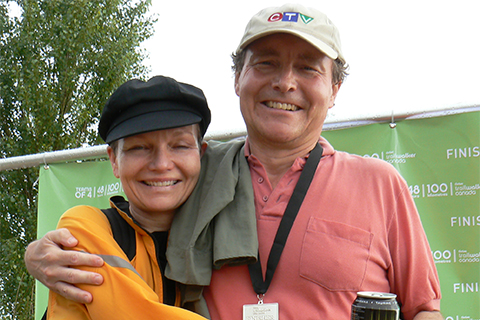In 1988, lawyer Randy Pepper took just under 25 hours to walk a 100-kilometre trail in Hong Kong – passing small villages, tramping deserted beaches, and even dodging a low-level typhoon.
Pepper had volunteered for this. With three teammates, he was taking part in the Oxfam Trailwalker fundraiser, a gruelling 48-hour challenge modelled after an army exercise of the Queen’s Gurkha Signals Regiment in Hong Kong. In 1986, Oxfam ran one of the 100 km events as a benefit to help the Gurkhas, Nepalese soldiers who served in the British Army but received no pension. It has since become a general fundraiser for Oxfam, held in 12 countries around the world.
The trail walk wasn’t Pepper’s first experience with fund raising or giving his time and energy. As a law student at U of T, he sat on the board of Canadian Crossroads International’s local chapter and took a volunteer trip to southern Africa. And it wasn’t to be his last. After he returned to Toronto he eventually became a director at Oxfam Canada (he was on the board from 2004-2007), where he recommended Trailwalker to his colleagues. The Canadian event launched in 2009 and this summer, 77 teams took on Georgian Bay’s Ganaraska Trail to raise around $412,000, with corporate matching dollars still coming in. Participants go through 10 checkpoints, where they find food, sleeping areas, and medical staff.
Pepper’s main Trailwalker role now is recruiting lawyers to participate. “Law firms can easily raise the funds for this,” he says. The six law firms that participated in 2012 raised $39,000, with one firm, Fogler Rubinoff, raising more than $10,000 alone. Pepper also came up with the Lawyers’ Cup – the title goes to the firm that raises the most money. To sweeten the pot, he treats the winning team of four and their guests to a lavish dinner. “Hopefully, they forget some of the pain,” he says.
It takes a lot to keep together four young lawyers with heavy workloads, Pepper says. “Especially if they have a lot of training walks and they realize, ‘‘Bloody hell, it’s a lot of work!’”
He recalls that 22 hours into that first walk in Hong Kong, as he and others waited in line for food at a checkpoint, a buzz went around: the Nepalese soldier serving soup was a member of the winning team. He had finished in 13 hours and 35 minutes, gone home, slept, showered, and returned to help out.
But not everyone can or needs to push that hard, Pepper says. When he did Trailwalker for a second time in Canada, his team went off-trail to a B & B to sleep for five hours.
“I may do it again,” he says. “My fellow team members need to be encouraged.” But he might wait a bit before recruiting for 2013 – they also “may need more time before they forget what their feet felt like,” he smiles.






